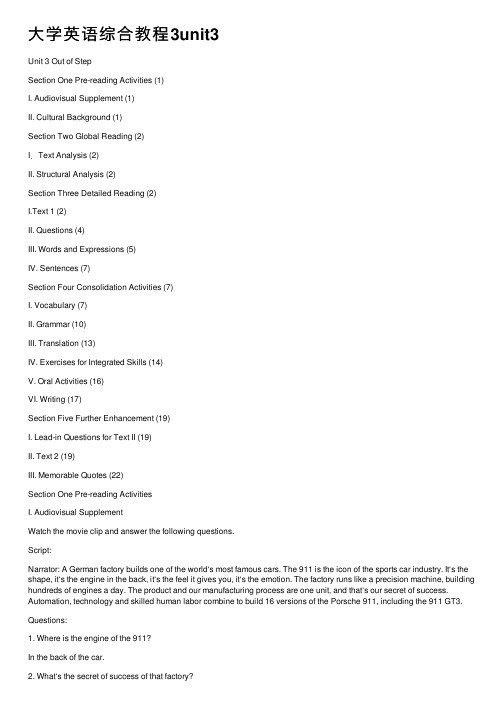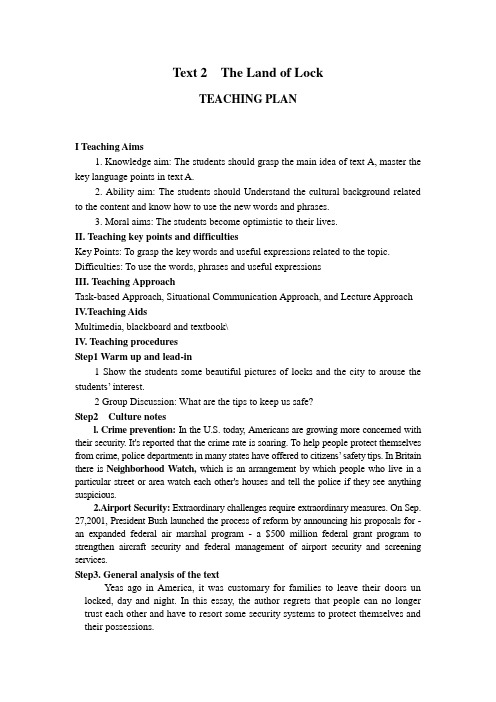大学英语unit3
大学英语综合教程3unit3

⼤学英语综合教程3unit3Unit 3 Out of StepSection One Pre-reading Activities (1)I. Audiovisual Supplement (1)II. Cultural Background (1)Section Two Global Reading (2)I.Text Analysis (2)II. Structural Analysis (2)Section Three Detailed Reading (2)I.Text 1 (2)II. Questions (4)III. Words and Expressions (5)IV. Sentences (7)Section Four Consolidation Activities (7)I. Vocabulary (7)II. Grammar (10)III. Translation (13)IV. Exercises for Integrated Skills (14)V. Oral Activities (16)VI. Writing (17)Section Five Further Enhancement (19)I. Lead-in Questions for Text II (19)II. Text 2 (19)III. Memorable Quotes (22)Section One Pre-reading ActivitiesI. Audiovisual SupplementWatch the movie clip and answer the following questions.Script:Narrator: A German factory builds one of the world‘s most famous cars. The 911 is the icon of the sports car industry. It‘s the shape, it‘s the engine in the back, it‘s the feel it gives you, it‘s the emotion. The factory runs like a precision machine, building hundreds of engines a day. The product and our manufacturing process are one unit, and that‘s our secret of success. Automation, technology and skilled human labor combine to build 16 versions of the Porsche 911, including the 911 GT3.Questions:1. Where is the engine of the 911?In the back of the car.2. What‘s the secret of success of that factory?The product and their manufacturing process are one unit. Automation, technology and skilled human labor combine to build the Porsche 911. And the factory runs like a precision machine.II. Cultural Background1. Car culture has been a major niche lifestyle in America.2. In the 1950s, the post-war boom produced a generation of teenagers with enough income to buy their own cars. These cars became so much more than just modes of transportation. They were reflections of a lifestyle. The ability to tune and soup-up muscle cars gave average Joes the opportunity to show off their power, their speed and their style in a way that personified the car as character.3. Like Granny in Jan and Dean's 1964 song ―The Little Old Lady from Pasadena,‖ we can't keep our foot off the accelerator.4. We are crazy about our cars —and always have been. ―The American,‖William Faulkner lamented in 1948, ―really loves nothing but his automobile.‖5. We dream of cars as we dream of lovers.6. Americans have always cherished personal freedom and mobility, rugged individualism and masculine force.Section Two Global ReadingI.Text AnalysisMain Idea―Out of Step‖ is an exposition that presents the absurdity of the Americans‘ dependence on cars. The Americans, being so accustomed to using cars, have almost forgotten the existence of their legs. Wherever they go, they go in their cars. As a result, pedestrian facilities are neglected in city planning or rejected by the inhabitants.II. Structural AnalysisParagraph 1-6 The writer introduces his idea with an anecdote.Paragraphs 7-13 In this part, the author presents the fact that the Americans are habituated to using cars for everything. Paragraphs 14-20 In this part, the author explains that pedestrian facilities are neglected or discarded.Section Three Detailed ReadingI.Text 1Out of StepBill Bryson1After living in England for 20 years, my wife and I decided to move back to the United States. We wanted to live in a town small enough that we could walk to the business district, and settled on Hanover, N.H., a typical New England town —pleasant, sedate and compact. It has a broad central green surrounded by the venerable buildings of Dartmouth College, an old-fashioned Main Street and leafy residential neighborhoods.2It is, in short, an agreeable, easy place to go about one‘s business on foot, and yet as far as I can tell, virtually no one does.3Nearly every day, I walk to the post office or library or bookstore, and sometimes, if I am feeling particularly debonair, I stop at Rosey Jekes Caféfor a cappuccino. Occasionally, in the evenings, my wife and I stroll up to the Nugget Theatre for a movie or to Murphy‘s on the Green for a beer, I wouldn‘t dream of going to any of these places by car. People have gotten used to my eccentric behavior, but in the early days acquaintances would often pull up to the curb and ask if I wanted a ride.4―I‘m going your way,‖ they would insist when I politely declined. ―Really, it‘s no bother.‖5―Honestly, I enjoy walking.‖6―Well, if you‘re sure,‖ they would say and depart reluctantly, even guiltily, as if leaving the scene of an accident without giving their name.7In the United States we have become so habituated to using the car for everything that it doesn‘t occur to us to unfurl our legs and see what those lower limbs can do. We have reached an age where college students expect to drive between classes, where parents will drive three blocks to pick up their children from a friend‘s house, where the letter carrier takes his van up and down every driveway on a street.8We will go through the most extraordinary contortions to save ourselves from walking. Sometimes it‘s almost ludicrous. The other day I was waiting to bring home one of my children from a piano lesson when a car stopped outside a post office, and a man about my age popped out and dashed inside. He was in the post office for about three or four minutes, and then came out, got in the car and drove exactly 16 feet (I had nothing better to do, so I paced it off) to the general store6 next door.9And the thing is, this man looked really fit. I‘m sure he jogs extravagant distances and plays squash and does all kinds of healthful things, but I am just as sure that he drives to each of these undertakings.10An acquaintance of ours was complaining the other day about the difficulty of finding a place to park outside the local gymnasium. She goes there several times a week to walk on a treadmill. The gymnasium is, at most, a six-minute walk from her front door.11I asked her why she didn‘t walk to the gym and do six minutes less on the treadmill.12She looked at me as if I were tragically simple-minded and said, ―But I have a program for the treadmill. It records my distance and speed and calorie burn rate, and I can adjust it for degree of difficulty.‖13I confess it had not occurred to me how thoughtlessly deficient nature is in this regard.14According to a concerned and faintly horrified 1997 editorial in the Boston Globe, the United States spent less than one percent of its transportation budget on facilities for pedestrians. Actually, I‘m surprised it was that much. Go to almost any suburb developed in the last 30 years, and you will not find a sidewalk anywhere. Often you won‘t find a single pedestrian crossing.15I had this brought home to me one summer when we were driving across Maine and stopped for coffee in one of those endless zones of shopping malls, motels, gas stations and fast-food places. I noticed there was a bookstore across the street, so I decided to skip coffee and head over.16Although the bookshop was no more than 70 or 80 feet away, I discovered that there was no way to cross on foot without dodging over six lanes of swiftly moving traffic. In the end, I had to get in our car and drive across.17At the time, it seemed ridiculous and exasperating, but afterward I realized that I was possibly the only person ever to have entertained the notion of negotiating that intersection on foot.18The fact is, we not only don‘t walk anywhere anymore in this country, we won‘t walk anywhere, and woe to anyone who tries to make us, as the city of Laconia, N.H., discovered. In the early 1970s, Laconia spent millions on a comprehensive urban renewal project, which included building a pedestrian mall to make shopping more pleasant. Esthetically it was a triumph —urban planners came from all over to coo and take photos--but commercially it was a disaster. Forced to walk onewhole block from a parking garage, shoppers abandoned downtown Laconia for suburban malls.19In 1994 Laconia dug up its pretty paving blocks, took away the tubs of geraniums and decorative trees, and brought back the cars. Now people can park right in front of the stores again, and downtown Laconia thrives anew.20And if that isn‘t sad. I don‘t know what is.II. Questions1)What kind of town is it? (Paragraph 1)It is a small, pleasant and agreeable town. The inhabitants are friendly and willing to help.But although the town is compact, few people go about on foot.2)What is considered the author‘s ―eccentric behavior‖? (Paragraph 3)Instead of riding a car, the author walks around the city, doing his shopping, going to themovies or visiting the café or bar. To people who are used to going everywhere in a car, he is an eccentric.3)Why would drivers ―depart reluctantly, even guiltily‖when their offer was declined?(Paragraphs 3-6)With cars becoming the basic essentials of their life, people are so habituated to using the car for everything. The scene of somebody walking around seemed so unusual to them that they would naturally show their concern to him. When their offer to give him a ride was declined, they were sorry for not being able to help him out.4) Why did the author say ―Actually, I‘m surprised it was that much‖? (Paragraph 14)When the author found that the newly planned suburbs totally overlooked pedestrian needs, he assumed there was no budget for pedestrian facilities at all. So he says he was surprised to learn that there actually was less than one percent of budget on it. Here the author writes with a touch of irony.5) Why did Laconia change its downtown pedestrian mall to one with parking lots? (Paragraphs18-19)Although the pedestrian mall was well decorated, shoppers were unwilling to walk to the stores from a parking garage. As a result, it was a commercial failure. The government had to compromise with the public preference.Class ActivityGroup discussion: What does the title mean?With the use of this title, the writer seems to suggest1. people no longer walk in America;2. the few people who do walk seem to be old-fashioned and ―eccentric‖.III. Words and ExpressionsParagraphs 1-6sedate a. calm, serious and formale.g. She is a sedate old lady; she is caring but never talks much.The fight against a nuclear power station site has transformed a normally sedate town into a battlefield.v. make calm or sleepy, esp. with a druge.g. The patient was heavily sedated and resting quietly in bed.Derivation: sedately (ad.), sedation (n.), sedative (a., n.)eccentric a.(of people or behavior) unconventional and slightly strangee.g. The old gentleman, who lived alone all his life, was said to have some eccentric habits.n. a person of unconventional and slightly strange views or behaviore.g. The old gentleman enjoyed a colorful reputation as an engaging eccentric.curb n. (British English: kerb) a line of raised stones separating the footpath from the road v./ n. ( place) a control or limit on sth. undesirablee.g.Poor nutrition can curb a child‘s development both physically and mentally.There will be now curbs on drunk-driving from next month.Paragraphs 7-12habituate v. accustom by frequent repetition or prolonged exposuree.g. You must habituate yourself to reading aloud.By the end of the school term, the students had been habituated / accustomed / used to rising at five o‘clock.contortion n. a twisted position or movement that looks surprising or strangee.g. The spectators cannot but admire the contortions of the gymnasts.Derivation: contort v. cause sth. to twist out of its natural shape and looks strange or unttractive Comparison: distort, twist, deform, contort & warpThese verbs mean to change and spoil the form or character of sth.distortTo distort is to alter in shape, as by torsion or wrenching; the term also applies to verbal or pictorial misrepresentation and to alteration or perversion of the meaning of sth.e.g. The human understanding is like a false mirror, which, receiving rays irregularly distorts and discolors the nature of things by mingling its own nature with it. (Francis Bacon).twistTwist applies to distortion of form or meaning.e.g. a mouth twisted with painHe accused me of twisting his words to mean what I wanted them to.deformIf you deform sth., or if it deforms, its usual shape changes so that its usefulness or appearance is spoiled.e.g. Great erosion deformed the landscape.The earlier part of his discourse was deformed by pedantic divisions and subdivisions.contortIf you contort sth., or if it contorts, it twists out of its normal shape and looks strange or unattractive.e.g. a face contorted with rage;a contorted line of reasoning.warpWarp can refer to a turning or twisting from a flat or straight form.e.g. The floorboards had warped over the years.It also can imply influencing sb. in a way that has a harmful effect on how they think or behave.e.g. Prejudice warps the judgment.Paragraphs 13-20bring sth. home to sb.: make sb. realize sth.e.g.The news report has brought home to us all the plight of the prisoners of war.Comparison: drive sth. home to sb., hit / strike homedrive sth. home to sb.: make sb. realize sth., esp. by saying it often, loudly, angrily, etc.e.g. The professor drove home to them that they must finish the writing assignment by Friday.hit / strike home: (of remarks, etc.) have the intended (often painful) effecte.g. You could see from his expression that her sarcastic comments had hit/stricken home.entertain v. consider an idea, etc. or allow yourself to think that sth. might happen or be truee.g. He refused to entertain our proposal.entertain ideas, doubts, etcnegotiate v.get over or past (an obstacle, etc.) successfully; manage to travel along a difficult routee.g. The only way to negotiate the path is on foot.Frank Mariano negotiates the dessert terrain in his battered pickup.Practice那攀登者得攀越⼀陡峭岩⽯。
大学英语自学教程(上册)课后答案及释义UNIT3

第一部分 Text A【课文译文】大 西 洋大西洋是将欧洲和美洲分隔开的海洋之一。
它使南北美洲长达几个世纪之久都未被人发现。
人们对大西洋有许多误解,这使得早期的海员不愿意远航驶入大西洋。
一种想法是大西洋远抵“世界的边缘”,海员们担心他们会一直航行到地球边上掉落下去。
另一个想法是在赤道处,大西洋的海水是滚烫的。
大西洋的面积只是太平洋的一半,但也非常辽阔。
哥伦布穿越过的地方宽达4000多英里(6000公里)。
即使最窄的地方宽度也有大约2000英里(3200公里),这是一片位于南美洲最东端与非洲最西端之间的水域。
大西洋有两点非同寻常。
其一是在如此辽阔的海洋里少有岛屿。
另外,大西洋是世界上含盐量最高的海洋。
大西洋海水量很大,人们无法想像到底有多少水。
但如果假设不再有降雨和河水注入,则需4000年大西洋才会干涸。
大西洋平均水深有2英里(3.2公里)多一点,但有些地方要深得多。
最深处在波多黎各岛附近,深达30246英尺——约6英里(9.6公里)。
世界上最长的山脉之一从大西洋海底隆起,这条山脉沿海底中部向南北延伸,几座山峰露出海面,形成岛屿。
亚速尔群岛就是大西洋中部山脉露出水面的几座山峰。
佛罗里达州向东几百英里有一处海域叫马尾藻海,这里由于很少刮风,海面很平静。
在使用帆船的时代,船员们担心他们会因无风而在此处无法航行。
有时他们确实会遇到这种情况。
海流有时被称作“海洋中的河流”。
大西洋有一条这种“河流”,叫做墨西哥湾流,这是一股暖水流;另外一条是拉布拉多海流——这是来自北冰洋的冷水流。
洋流对流域附近大陆的气候有影响。
大西洋为两岸的人们提供了丰富的食物。
大浅滩是最著名的捕鱼区之一,位于纽芬兰附近。
今天,大西洋是一条重要的航路,这条航路并不总是风平浪静,毫无危险。
暴风雨会掠过洋面,堆起大浪。
从北冰洋漂来的冰山也会横穿航道。
我们现在有快捷的旅行方式,这个大洋似乎也变小了。
哥伦布横越大西洋用了两个多月的时间,一艘现代化快轮不到4天就可完成这一航程,而乘飞机从纽约到伦敦只用8小时,从南美到非洲只用4小时。
全新版大学英语第三册 unit 3

Pre-reading Tasks
Security on Campus
Example 1: Campus Theft
steal/ burglarize/ shoplift/pinch
cheat/ swindle/ deceive/ defraud rob/ murder/ harass
Pre-reading Tasks
Part 2 Supporting Facts for the Central Idea
In this text the author uses lots of facts to support his central point of view: America is deteriorating from “the Land of the Free” into “the most insecure nation”. Could you find any more supporting facts? Reference on Text Organization practice on page78.
文档仅供参考picturesof911文档仅供参考whilereadingtasks?textorganization?textscanningscanthetexttofindtermsfordifferentsecuritysystems?comprehensionquestionsforeachpart?languagepoints文档仅供参考textorganizationpartslinesmainideas11112126036174inamericatheeraofleavingthefrontdooronthelatchhasdrawntoaclose
新视野大学英语3教案unit3

一、教学目标1. 知识目标:(1)掌握本单元的生词、短语和句型;(2)理解并分析课文内容,提高阅读理解能力;(3)了解并掌握写作技巧,提高写作能力。
2. 能力目标:(1)提高学生的口语表达能力,使学生能够在日常生活中运用所学词汇和句型;(2)培养学生分析问题、解决问题的能力;(3)提高学生的团队合作能力。
3. 情感目标:(1)激发学生对英语学习的兴趣,培养学生热爱英语的情感;(2)使学生认识到团结协作的重要性,培养学生的团队精神。
二、教学重点与难点1. 教学重点:(1)生词、短语和句型的掌握;(2)课文内容的理解与分析;(3)写作技巧的运用。
2. 教学难点:(1)复杂句型的理解和运用;(2)文章主旨和大意的把握;(3)写作思路的拓展。
三、教学过程1. 导入新课(1)通过提问、讨论等方式,引导学生回顾上一单元所学内容;(2)展示与新课主题相关的图片或视频,激发学生的学习兴趣。
2. 课文学习(1)学生自读课文,勾画生词、短语和句型;(2)教师讲解生词、短语和句型,并举例说明;(3)分析课文内容,引导学生理解文章主旨和大意;(4)讨论课文中的重点句子,提高学生的语言运用能力。
3. 课堂活动(1)小组讨论:针对课文内容,进行小组讨论,培养学生的团队合作能力;(2)角色扮演:选取课文中的对话,让学生进行角色扮演,提高口语表达能力;(3)翻译练习:将课文中的句子翻译成中文,加深学生对课文内容的理解。
4. 写作指导(1)教师讲解写作技巧,如段落结构、开头和结尾等;(2)学生根据所学内容,进行写作练习;(3)教师批改作文,指出学生的不足,并进行针对性指导。
5. 总结与作业布置(1)总结本节课所学内容,强调重点和难点;(2)布置课后作业,如阅读课文、翻译句子、写作练习等。
四、教学反思本节课通过多种教学手段,激发学生的学习兴趣,提高学生的英语综合运用能力。
在今后的教学中,我将进一步优化教学过程,关注学生的个体差异,使每个学生都能在课堂上有所收获。
大学英语 Unit3课文讲解ppt课件

paraII: It works in reverse, too, for the inanimate portion of Earth is shaped and molded by life.
The enormous ocean reefs are formed by coral.
The nature of the atmosphere has been changed by plant activity
•etween 2 billion and 3 billion years ago, portions of the surface water, bathed by the energetic radiation from the sun, developed complicated compounds in organization sufficiently versatile to qualily as what we call "life". Life forms have become more complex and more various ever since.
Cells in those organs that suffer constant wear and tear—as in the skin or in the intestinal lining—grow and multiply all life long. Other cells, not so exposed, as in nerve and muscle, do not multiply at all in the adult, under any circumstances. Still other organs, ordinarily quiescent, as liver and bone, stand ready to grow if that is necessary to replace damage. When the proper repairs are made, growth stops.
全新版大学英语3unit3

Text 2 The Land of LockTEACHING PLANI Teaching Aims1. Knowledge aim: The students should grasp the main idea of text A, master the key language points in text A.2. Ability aim: The students should Understand the cultural background related to the content and know how to use the new words and phrases.3. Moral aims: The students become optimistic to their lives.II. Teaching key points and difficultiesKey Points: To grasp the key words and useful expressions related to the topic. Difficulties: To use the words, phrases and useful expressionsIII. Teaching ApproachTask-based Approach, Situational Communication Approach, and Lecture Approach IV.Teaching AidsMultimedia, blackboard and textbook\IV. Teaching proceduresStep1 Warm up and lead-in1 Show the students some beautiful pictures of locks and the city to arouse the students’ interest.2 Group Discussion: What are the tips to keep us safe?Step2 Culture notesl. Crime prevention: In the U.S. today, Americans are growing more concerned with their security. It's reported that the crime rate is soaring. To help people protect themselves from crime, police departments in many states have offered to citizens’ safety tips. In Britain there is Neighborhood Watch, which is an arrangement by which people who live in a particular street or area watch each other's houses and tell the police if they see anything suspicious.2.Airport Security: Extraordinary challenges require extraordinary measures. On Sep. 27,2001, President Bush launched the process of reform by announcing his proposals for - an expanded federal air marshal program - a $500 million federal grant program to strengthen aircraft security and federal management of airport security and screening services.Step3. General analysis of the textYeas ago in America, it was customary for families to leave their doors un locked, day and night. In this essay, the author regrets that people can no longer trust each other and have to resort some security systems to protect themselves and their possessions.There are several e.g. of comparison and contrast in this article. Para 1 vs. Para 4, para 10 vs. Para 11, Para 12 vs. Para 13. The first pair is the opening of the whole piece of writing. The latter two are just two supporting details for the central argument.Step4 Ask the students to go over the text, then analyze the structure of the text.We can divide the text into four parts. Part one paras.1-3 ,part two paras.4-7 part three paras.8-11 part four paras.12-15,ask the students to get the general idea of each part.Step5 Analyze the material in detail(some language points)1. on the latch: (of a door) closed but not lockedE.g.: Let yourself in; the door is on the latch.Don't forget to leave the front door on the latch if you go to bed before I comeback.2.vulnerable: exposed to danger or attack; unprotectedE.g.; Museums in the developing world often have fewer security measures and thusremain more vulnerable to thefts.3.tranquil: calm, quite and undisturbedE.g.: Visitors like to stay in this hotel because it's beautiful and located in a tranquillake area.4.era: a period of history or a long period of timeE.g.: The dinosaurs died out about 66 million years ago, at the end of the MesozoicEra.We are living in the computer era.5. barrier: thing that prevents progress or movementE.g.: The driver slowed down as he approached the police barrier. The programserves as a barrier that stops children viewing unhealthy programs on theInternet.6.take off: (aircraft, bird or insect) move from the ground and begin to flyE.g.: Kids like watching planes take off and land.The plane didn't take off on time because of the heavy storm.7.hold/keep (sb.) at bay: prevent (an enemy, pursuers, etc.) from coming nearE.g.: Eating oranges keeps colds at bay.She left the light on to keep her fears at bay.8.stand for: represent; meanE.g.: That newspaper is often thought to stand for freedom of speech. "GMT" standsfor Greenwich Mean Time.9.with/by a small/large margin:E.g.: Governor Bush won the election but by a small margin.Demands for college education exceeds capacity by a large margin.Step Three Oral PracticePair work: (questions and answers)1. In the author's boyhood, did he have to carry keys with him if he stayed out late atnight? (No. It's safe to go out at that time.)2 Do people nowadays keep up the custom of leaving the front door on the latch atnight? (No. People are worried about security of their property and themselves.)3. Is there a similar problem in other parts of the world today? (Y es. Let's take Chinafor example,...)Speech: (topics for independent speech)What Can We Do to Reduce Crime (5 minutes in class)Step7 SummaryStep8 Assignments1. Review what is learned in this lecture.2. Do the exercises on the text book。
全新版大学英语UNIT-3课文翻译及课后答案

全新版大学英语UNIT-3课文翻译及课后答案UNIT 3Text AMaia Szalavitz, formerly a television producer, now spends her time as a writer. In this essay she explores digital reality and its consequences. Along the way, she compares the digital world to the "real" world, acknowledging the attractions of the electronic dimension.迈亚·塞拉维茨曾是电视制片人,目前从事写作。
她在本文中探索了数字化世界及其后果。
与此同时,她将数字化世界与真实世界做了比较,承认电子空间自有其魅力。
A Virtual LifeMaia SzalavitzAfter too long on the Net, even a phone call can be a shock. My boyfriend's Liverpool accent suddenly becomes impossible to interpret after his easily understood words on screen; a secretary's clipped tone seems more rejecting than I'd imagined it would be. Time itself becomes fluid — hours become minutes, or seconds stretch into days. Weekends, once a highlight of my week, are now just two ordinary days.虚拟世界的生活迈亚·塞拉维茨在网上呆了太久,听到电话铃声也会吓一大跳。
新编大学英语第四册_Unit_3_Gender_Differences_课件

Development (Para. 2-4)
There is a cultural bias in education that favors boys over girls. Teachers called on males in class far more than on female students. (Para.2) Teachers assigned boys and girls different tasks according to stereotyped gender roles. (Para.3) Gender-biased education is also reflected in the typical American teacher’s assumption that boys will do better in science subjects while girls tend to have better verbal and reading skills. (Para.4)
Ideal Wife and Ideal Husband
Directions: Work in pairs and discuss the following questions.
1) From your point of view, what are the characteristics of the ideal wife and the ideal husband? 2) Would the ideal wife and the ideal husband have been different in your parents’ generation and in your grandparents’ generation? If so, how? Possible characteristics of the ideal husband/wife: Ideal husband 1) tall, handsome and strong 2) capable of supporting a family Ideal wife 1) beautiful and healthy 2) warm-hearted
- 1、下载文档前请自行甄别文档内容的完整性,平台不提供额外的编辑、内容补充、找答案等附加服务。
- 2、"仅部分预览"的文档,不可在线预览部分如存在完整性等问题,可反馈申请退款(可完整预览的文档不适用该条件!)。
- 3、如文档侵犯您的权益,请联系客服反馈,我们会尽快为您处理(人工客服工作时间:9:00-18:30)。
12.engage vi 从事,雇用, engage in = take part in sth. / doing sth(使)从事; (使)忙于 I have no time to engage in telling stories. 我没有时间闲聊。 雇用;聘用 ---She was engaged as a teacher. 她被聘作教师。
3.Now that I am older, I believe that is a proper standard by which to judge people, even though I still don‟t know precisely what a “good heart” is.(L24~25) 主干:…I believe…其中now that I am older为now that引导 的原因状语从句;that is a…为宾语从句,做believe的宾 语,而在这个宾语从句中by which to…为定于从句修饰 standard; even though I …为让步状语从句,其中what a “good heart” is为宾语从句作know的宾语。 译文:如今我已经成熟了许多,我开始相信这才是衡量 一个人的恰当的标准。虽然我还不能十分确切地弄明白 什么事一颗“善心”。
While-reading Activities
New Words
1. lean vi. 倾斜;倚靠,依赖
vi.= 不及物动词,后面要加介词或其他词 There is a ladder leaning against the wall. lean forward 向前倾 A good heart to lean on.(依赖,依靠)
Unit 3 A Good Heart to Lean on
第三单元: 可依靠的一颗善心
课文内容概要
This text gives the description that how shamed a son felt as a youth when he walked down the street with his crippled father. The son did not like the way people stared at them. His father never let on that he saw any of this. He was very active and enjoyed life, and he took part in activties through his son. At last, the son learned that his father had a good heart. His father has been gone many years and the son is sorry he did not tell him how much he admired him. Now , he often remembers his father‟s examples(往事).
--即使你不喜欢西安,但它还是值得一 游。
--Even if you dislike Xian, but it is worth a visit.
7.On one‟s way (to) 在路上
--On our way to the seaside, the car broke down. 8. Even though 虽然,尽管 --He borrowed my car, even though I told him not to. 9. Break out 爆发
4. Inward adj. 在内的,内部的 outward外部的 Outwardly strong but inwardly weak. 外强中干。
5. bot,纠纷, 麻烦的事情
bother sb. about/with sth. 因某事打扰某人 ---Don‟t bother me with/about it.
13. urge v. 鼓励,激励 urge sb. to do sth. ---He urged us to go. 他力劝我们去。
Phrases& Expressions
1. lean on 依靠 --我们遇到困难时靠朋友帮助。 --We lean on out friends when we are in trouble. 2. grow up 成长起来,长大 --我父亲是在中国长大的。 --My father grew up in China. 3. let on 泄露,透漏 --别向她泄露秘密。
注释:要使我们俩步调一致不是件容易的事情,因为 他走起来一瘸一拐的,而我却总想快些走。因此 我们路上很少讲话。
2. In Manhattan the subway station was in the basement of his office building, and he would not have to go outside again until we met him in Brooklyn on his way home.(L15~17) 主干:…the subway station was in the basement of his office building, and he would not have to go outside again…其中until we met…为until 引导的时间状语从 句。 注释:地铁在曼哈顿的车站正好是他办公楼的地下 一层,所以在我们去布鲁克林站接他回家前,他就 不用再到室外去了。
6. halt v. 暂停;中断;中止 Work was halted when the machine broke down.
7.Pace n. 速度,步速 vi. 慢步走 keep/hold pace with 跟上,与。。。同 步 ---Keep pace with the times.与时俱进。
1. It was difficult to coordinate our steps-his halting, mine impatient-and because of that, we didn‟t say much as we went along.(L5~6)
主干:It was difficult to coordinate our steps…and…we didn‟t say much…其中it做形式主语,动词不定式to coordinate…做真正的主语。破折号起补充说明作 用,两个句子用and连接,because of that 为原因状 语,as we went along为伴随状语从句。
2. balance
平衡;均衡
Riders need a good sense of balance. 骑马的人需要有良好的平衡感。
It„s difficult to keep one‟s balance on an icy street. 在结冰的街道上保持平衡是不容易的。 3. severe adj. 严厉的;苛刻的;剧烈的;严峻的 a severe headache 剧烈的头疼 The dry spell is becoming more and more severe. 旱灾日益严重。 a severe punishment 严厉的惩罚
Part3 p7~10: The son now realizes that his father treated others with a good heart.
Part4 p11~13: The son realizes that his father had helped him keep his balance in life.
11. complain v.抱怨;诉苦 complain that … complain to sb. Of/about sth. complain of doing sth. complaint n.抱怨 make a complaint about/ of提出了投诉 receive complaints about/of 收到/接到…投诉
4. On one occasion a fight broke out at a beach party,with every one punching and shoving.(L32~33)
主干:…a fight broke out…其中with everyone puuching and shoving为with 引导的独立主格结构 作句子的状语。 译文:再一次沙滩聚会上,突然发生了打斗, 人人都挥拳上阵,大打出手。
Post-reading Activities
Exercises
Comprehension of the text
He felt embarrassed to be seen with his father, because his father was crippled and very short. 2. He always said, “You set the pace. I will try to adjust to you.” 3. He means that being on time for work was something worth pride. 4. When the weather was bad, his father went to work with the help of the writer and his sisters, who would pull him through the icy streets on a child‟s wagon with steel runners to the subway entrance.
--World war broke out in 1939.
